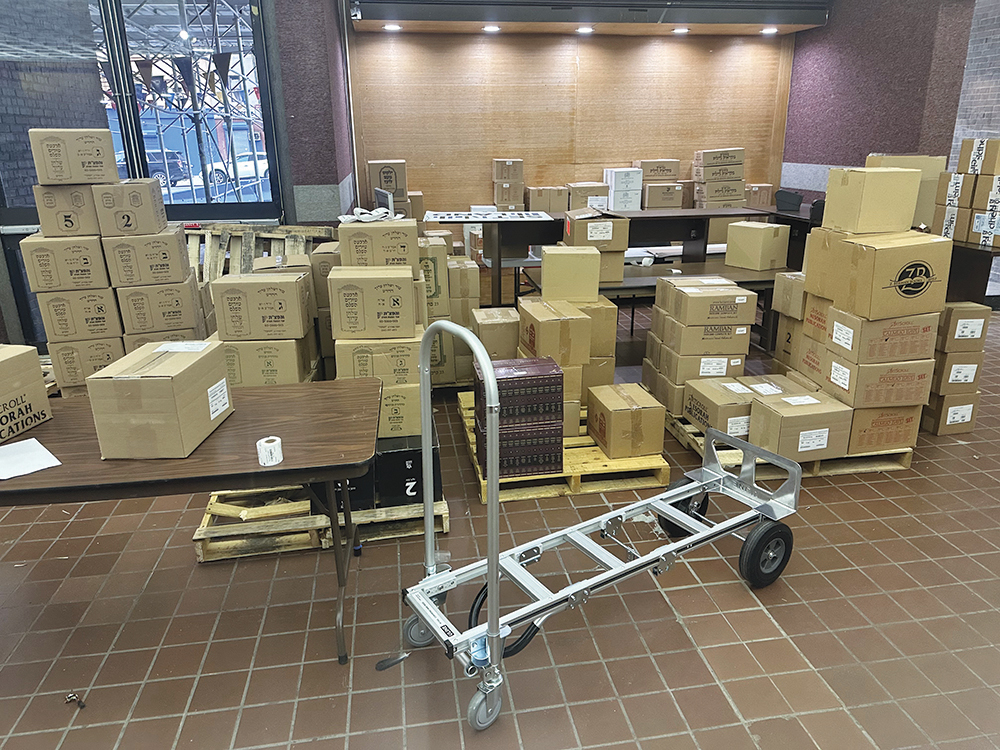
As the seforim sale at Yeshiva University kicks off its yearly run this Sunday, it seems appropriate to pull back the curtain on the work that goes into making the sale a success every year. While it might seem simple to sell books, the thousands of hours of work and dedication that go into making the sale happen every year are no small feat.
The sale, which was founded in 1964 and has been selling seforim in various capacities ever since, is well-known in the broader New York Jewish community, with thousands of shoppers attending yearly. In its modern iteration as a three-week event, the sale stocks well over 6,000 titles each year, with a reputation for low prices and events with authors of new or popular books.
Just after the 2023 sale was taken down and returned, this year’s began. In April 2023, CEO Yosef Silver started with preliminary planning, hiring head staff and working with YU to ensure the success of this year’s sale. Over the next few months, through dozens of hours of meetings and decisions, the sale’s staff came together. Head staff, consisting mostly of employees from last year’s sale who chose to return for another year, this time in a leadership role, worked to interview and train the over 60 general staff employees.

The tens of thousands of books have been in the process of being ordered since September. The ordering team has been contacting well over 100 vendors and arranging massive orders of trucks full of books. The vendors range in size from those supplying hundreds of titles, like Artscroll, Koren and Feldheim, to individual authors.
As orders are finalized but before they come in, attention is turned to all the other myriad details that students painstakingly organize, including ordering materials for packaging and shipping to fulfill online orders. Months are spent arranging events with authors — like this Sunday’s 2 p.m. lecture by Rav Hanoch Teller; a 7 p.m. speech on Monday, Feb. 12 by Bracha Poliakoff, author of “Reclaiming Dignity”; and a 1 p.m. address on Sunday, Feb. 18 by Rabbi Shlomo Brody, author of “Ethics of Our Fighters: A Jewish View on War and Morality.” Students also ensure that the technology, from the sale’s website to the barcode scanners, is working properly and work with each vendor to ensure their books are displayed and sold in the manner they want.
Over winter break, just after finals conclude, the sale finally begins to take shape physically: over 125 bookshelves fill Weisberg Commons, the first floor of YU’s Belfer Hall, their empty shelves an invitation for something great to transpire. Then come boxes and pallets of books. A smaller vendor here, a truck with 100 boxes there. At all hours of the day and night, head staff and general staff work to take in these boxes and organize them. After winter break, the sale begins in earnest with two weeks of setup, mostly at night after long days of school. Over two weeks, tens of thousands of books are unboxed, labeled and shelved. A registry and shipping department are set up with cashiers, section managers and backend employees trained and prepared to help customers check out, organize sections and help customers find books, and ship out orders and process reorders of books from vendors.

During the sale, students pour in dozens of hours of their time, spending school nights, Sundays and Motzei Shabbos, helping thousands of customers select, find and purchase books ranging from Jewish philosophy to volumes of Gemara to siddurim. Beyond that, they stay late after closing time to organize books that were moved during the day, shelve new books and resolve discrepancies and issues.
Three weeks later, the sale closes to the public but there is still work to be done. All of the unsold books must have their labels removed and boxed and shipped back to the vendors who supplied them. Total sales must be recorded so that sales reports can be sent out to vendors, and all of the supplies, shelves and pallets must be returned to storage until next year’s sale starts … a few weeks later.
More than just being a business that sells books to the community, the seforim sale is an incredible experience for YU students. Every detail of running the business is handled by YU students, creating valuable opportunities to learn and grow in ways a classroom can’t provide, from interacting with vendors to working with customers to building relationships with coworkers in a work setting.

Students enjoy working at the sale so much that not only do many come back the next year, but students who aren’t even working there will regularly show up to help out in whatever way they can. The sale takes a lot of work to make happen every year, but working there is a great way to serve the community and a highlight of students’ time at YU that many alumni look back on fondly years after they’ve left.









